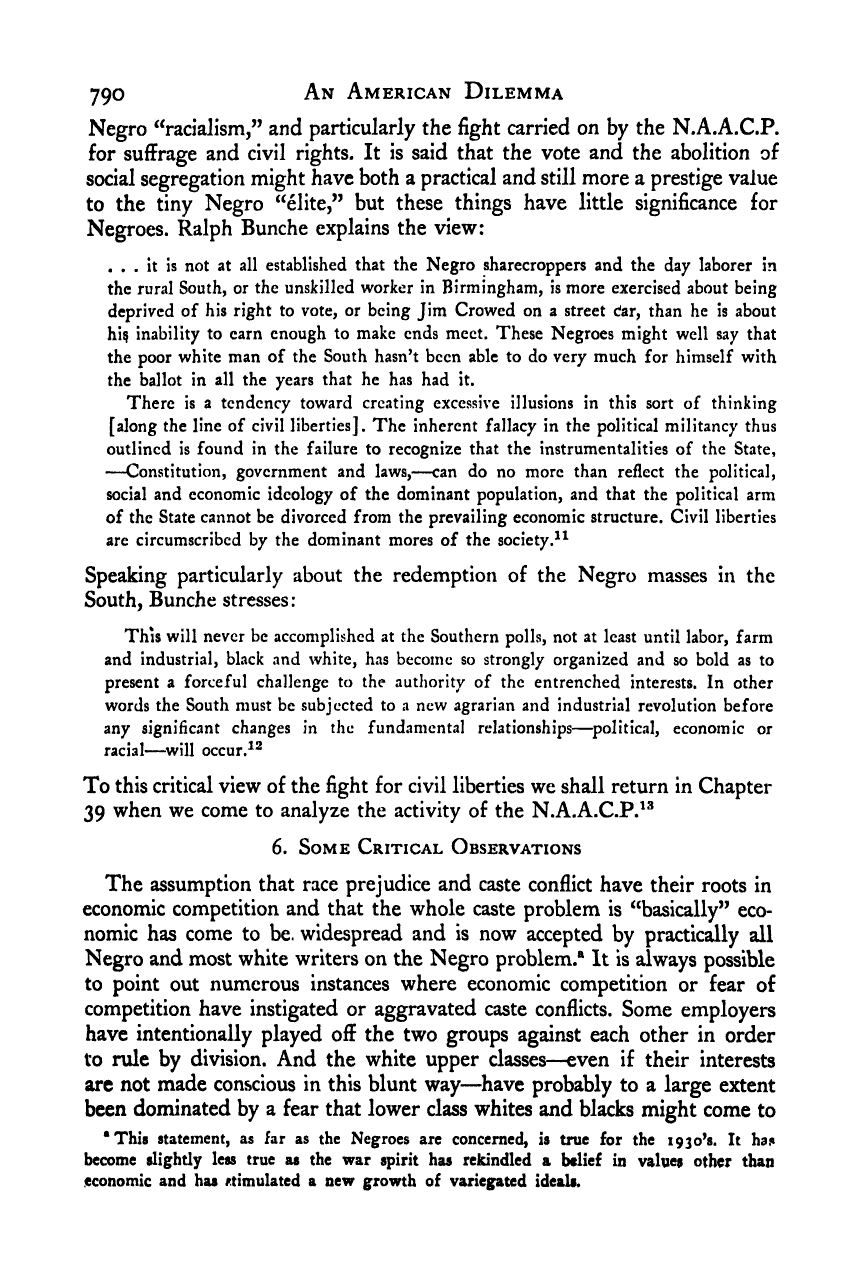Note: Gunnar Myrdal died in 1987, less than 70 years ago. Therefore, this work is protected by copyright, restricting your legal rights to reproduce it. However, you are welcome to view it on screen, as you do now. Read more about copyright.
Full resolution (TIFF) - On this page / på denna sida - IX. Leadership and Concerted Action - 38. Negro Popular Theories - 5. The Doctrine of Labor Solidarity - 6. Some Critical Observations

<< prev. page << föreg. sida << >> nästa sida >> next page >>
Below is the raw OCR text
from the above scanned image.
Do you see an error? Proofread the page now!
Här nedan syns maskintolkade texten från faksimilbilden ovan.
Ser du något fel? Korrekturläs sidan nu!
This page has never been proofread. / Denna sida har aldrig korrekturlästs.
790 An American Dilemma
Negro ^^racialism,” and particularly the fight carried on by the N.A.A.C.P.
for suffrage and civil rights. It is said that the vote and the abolition of
social segregation might have both a practical and still more a prestige value
to the tiny Negro ‘‘elite,” but these things have little significance for
Negroes. Ralph Bunche explains the view:
... it is not at all established that the Negro sharecroppers and the day laborer in
the rural South, or the unskilled worker in Birmingham, is more exercised about being
deprived of his right to vote, or being Jim Crowed on a street dar, than he is about
hi§ inability to earn enough to make ends meet. These Negroes might well say that
the poor white man of the South hasn’t been able to do very much for himself with
the ballot in all the years that he has had it.
There is a tendency toward creating excessive illusions in this sort of thinking
[along the line of civil liberties]. The inherent fallacy in the political militancy thus
outlined is found in the failure to recognize that the instrumentalities of the State,
—Constitution, government and laws,—can do no more than reflect the political,
social and economic ideology of the dominant population, and that the political arm
of the State cannot be divorced from the prevailing economic structure. Civil liberties
are circumscribed by the dominant mores of the society.^
^
Speaking particularly about the redemption of the Negro masses in the
South, Bunche stresses:
This will never be accomplished at the Southern polls, not at least until labor, farm
and industrial, black and white, has become so strongly organized and so bold as to
present a forceful challenge to the authority of the entrenched interests. In other
words the South must be subjected to a new agrarian and industrial revolution before
any significant changes in the fundamental relationships—^political, economic or
racial—^will occur.^^
To this critical view of the fight for civil liberties we shall return in Chapter
39 when we come to analyze the activity of the N.A.A.C.P.^*’
6. Some Critical Observations
The assumption that race prejudice and caste conflict have their roots in
economic competition and that the whole caste problem is “basically” eco-
nomic has come to be. widespread and is now accepted by practicsilly all
Negro and most white writers on the Negro problem.® It is always possible
to point out numerous instances where economic competition or fear of
competition have instigated or aggravated caste conflicts. Some employers
have intentionally played off the two groups against each other in order
to rule by division. And the white upper classes—even if their interests
are not made conscious in this blunt way—have probably to a large extent
been dominated by a fear that lower class whites and blacks might come to
•This statement, as far as the Negroes are concerned, is true for the 1930’s. It ha.<
become slightly less true as the war spirit has rekindled a belief in values other than
economic and has stimulated a new growth of variegated ideals.
<< prev. page << föreg. sida << >> nästa sida >> next page >>